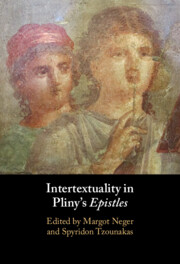Book contents
- Intertextuality in Pliny’s Epistles
- Intertextuality in Pliny’s Epistles
- Copyright page
- Contents
- Contributors
- Acknowledgements
- Abbreviations
- Introduction
- Part I Intertextuality and Interdiscursivity in Pliny’s Letters
- Chapter 1 Pliny, Man of Many Parts (Lucretius, Cicero, Valerius Maximus, Tacitus)
- Chapter 2 Intertextuality in Pliny, Epistles 6
- Chapter 3 Discourses of Authority in Pliny, Epistles 10
- Part II Models and Anti-Models: Pliny’s Interaction with Oratory and Natural History
- Part III Pliny and Seneca: Discourses of Grief and Posthumous Reputation
- Part IV Pliny’s Villas and Their Poetic Models
- Part V Pliny Turns Nasty: Satire and the Scoptic Tradition
- Part VI Final Thoughts: Discourses of Representation and Reproduction
- Bibliography
- General Subject Index
- Index Locorum
Chapter 1 - Pliny, Man of Many Parts (Lucretius, Cicero, Valerius Maximus, Tacitus)
from Part I - Intertextuality and Interdiscursivity in Pliny’s Letters
Published online by Cambridge University Press: 07 September 2023
- Intertextuality in Pliny’s Epistles
- Intertextuality in Pliny’s Epistles
- Copyright page
- Contents
- Contributors
- Acknowledgements
- Abbreviations
- Introduction
- Part I Intertextuality and Interdiscursivity in Pliny’s Letters
- Chapter 1 Pliny, Man of Many Parts (Lucretius, Cicero, Valerius Maximus, Tacitus)
- Chapter 2 Intertextuality in Pliny, Epistles 6
- Chapter 3 Discourses of Authority in Pliny, Epistles 10
- Part II Models and Anti-Models: Pliny’s Interaction with Oratory and Natural History
- Part III Pliny and Seneca: Discourses of Grief and Posthumous Reputation
- Part IV Pliny’s Villas and Their Poetic Models
- Part V Pliny Turns Nasty: Satire and the Scoptic Tradition
- Part VI Final Thoughts: Discourses of Representation and Reproduction
- Bibliography
- General Subject Index
- Index Locorum
Summary
This chapter has a simple argument: Pliny’s Epistles is a work of many intertextual parts. Neither beholden to Cicero’s Epistles, its professed generic forebear, nor privileging ‘poetic memory’ over prose, it integrates a broad range of predecessors, old and new, verse and prose. In a larger study of Plinian intertextuality Whitton has argued that Quintilian’s Institutio Oratoria is its unsuspected protagonist, with Tacitus’ Dialogus tightly caught up in the same weave. Rather than rehearsing those claims, he uses this short contribution to pick out some other ingredients to his mix. Three short passages (from Ep. 4.3, 5.16 and 7.1) include a long-forgotten reworking of Cicero’s Orator and hitherto unremarked imitations of Lucretius’ De Rerum Natura, Valerius Maximus’ Facta et Dicta Memorabilia and Tacitus’ Agricola. In examining these liaisons, the chapter exemplifies some modes and norms of Plinian imitatio and demonstrates that these works and authors all have a role in his pages (so, incidentally, adding to their reception histories). More broadly – if very selectively – it argues that Pliny’s generic self-positioning is a literary act of high ambition: for all its professed simplicity, the Epistles integrates a wide range of exemplary texts into its blend. We just need to start plumbing its depths.
Keywords
- Type
- Chapter
- Information
- Intertextuality in Pliny's Epistles , pp. 29 - 46Publisher: Cambridge University PressPrint publication year: 2023

